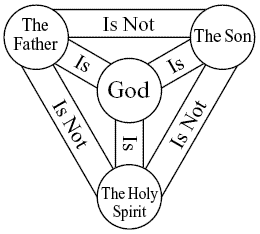The Trinity is an absurdity of Christian theology which caused intense battles prior to the Church of Rome assuming authority over the Catholic Church.
WARNING
The Trinity does not make any logical sense.
- "De mysterio Trinitatus recta confessio est ignoratio scientiae" --St. Jerome
Trinity Fun Time
Do you know your Trinity? Take this fun test to see if your theology matches up with the Bible!
- Mark 13:32: "No one knows about that day or hour, not even the angels in heaven, nor the Son, but only the Father."
God can know things Jesus can't.
- John 14:28: "You heard me say, 'I am going away and I am coming back to you.' If you loved me, you would be glad that I am going to the Father, for the Father is greater than I."
The Father and Son are not equal.
- 1 Timothy 2:5: "For there is one God, and one mediator between God and men, the man Christ Jesus"
Christ a mediator between God and Man. (Logical hint: God cannot be a "mediator" between God and anyone else.)
History of the Trinity Fun Time
The Trinity, being illogical, was widely ignored by many early Christians, who came up with alternative theologies. Some (Adoptionists) said Jesus was born human and only became divine later; others (Monarchianists) said that Jesus could never have been the same as God because God was One. One by one these theories were plucked out of mainstream Christianity by declaring their adherents to be devils and so forth for no apparent reason other than their refusal to accept a particular interpretation of a confusing text.
In the fourth century there was a great debate between the Nicene Church, which supported homoousios, and the Arian Church, which supported homoiousios. The former of these means that the Father and Son are made of the same stuff; the latter means that they are made of similar stuff. It was around this time that the (Nicene) Bishop of Rome started whining that he was supposed to have the power to make decisions to affect the whole Church. It is incorrect to say that the First Council of Nicaea had put an end to this debate, because the Arians actually outnumbered the Nicenes and thus gained the power to exile bishops who supported homoousios and so forth. Therefore the stupid arguments about this continued well into the fifth century.
The other major debate among early Catholic Christians was what day Easter should be celebrated on.
![[Everything Shii Knows]](../mediawiki/skins/common/images/wiki.png)
